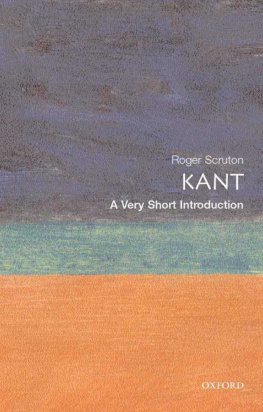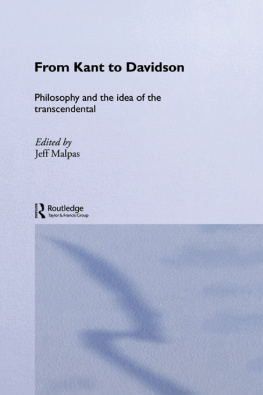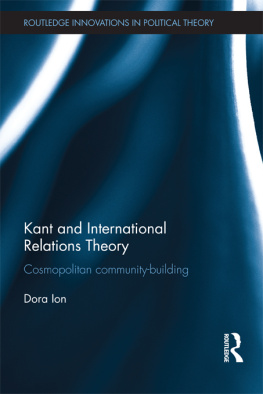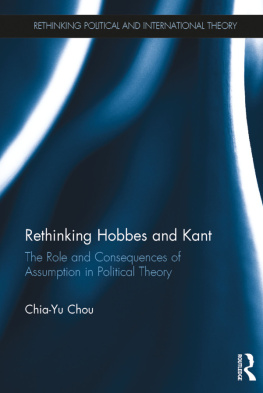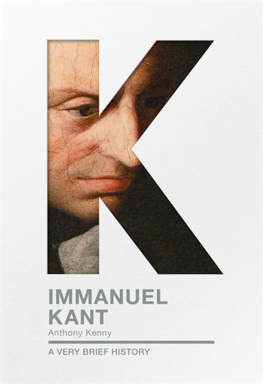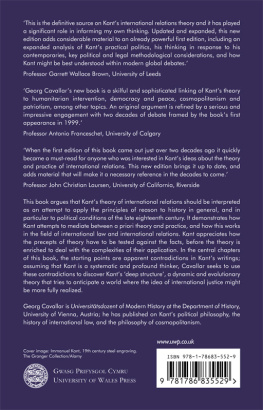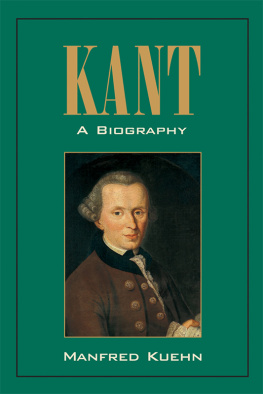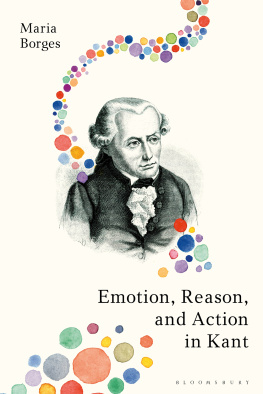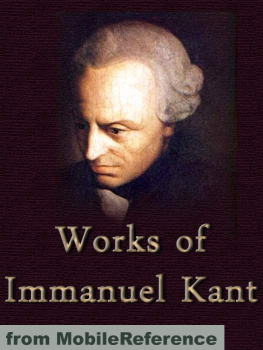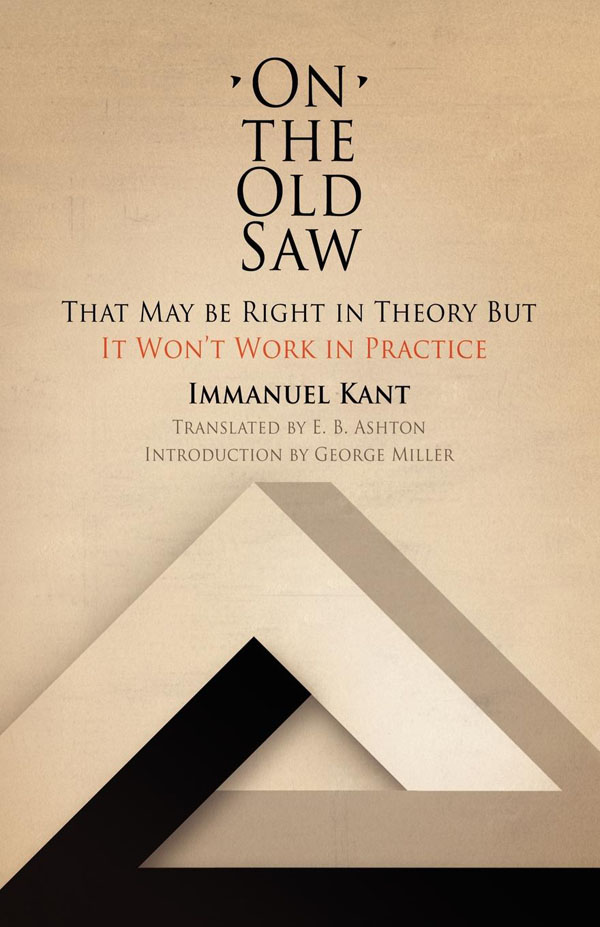ON THE OLD SAW
THAT MAY BE RIGHT IN THEORY BUT IT WONT WORK IN PRACTICE
ON THE OLD SAW
THAT MAY BE RIGHT IN THEORY BUT IT WONT WORK IN PRACTICE
IMMANUEL KANT
Translated by E. B. Ashton Introduction by George Miller

University of Pennsylvania Press Philadelphia
This translation is based on the German edition (known as Akademie Ausgabe) by the Koniglich Preussischen Akademie der Wissenschaften, Kants Gesammelte Schriften (Berlin and Leipzig: W. de Gruyter, 1923), 8: 273-313. The approximate pagination of that edition is indicated at the foot of each page of the translation.
English text copyright 1974 University of Pennsylvania Press
All rights reserved
Printed in the United States of America on acid-free paper
Published by
University of Pennsylvania Press
Philadelphia, Pennsylvania 19104-4112
Library of Congress Cataloging-in-Publication Data
Kant, Immanuel, 1724-1804.
On the old saw: that may be right in theory but it wont work in practice / Immanuel Kant; translated by E. B. Ashton ; introduction by George Miller.
[ber den Gemeinspruch: Das mag in der Theorie richtig sein, taugt aber nicht fr die Praxis. English]
p. cm.
ISBN-13: 978-0-8122-1058-3
ISBN-10: 0-8122-1058-1 (pbk.: alk. paper)
1. Theory (Philosophy). 2. Practice (Philosophy). 3. Ethics. 4. LawPhilosophy. I. Title B2794.U33 E52 1974
73083291
In Memoriam
Fred Wieck
our now silent collaborator,
one of the last of the civilized editors
Contents
ON THE OLD SAW:
THAT MAY BE RIGHT IN THEORY BUT IT WONT WORK IN PRACTICE
Foreword
Few people are so ignorant that they will dispute the value of theory. Yet men commonly denounce proposals that apply theory in daily life. Many of the finest insights of science, medicine, agriculture, ethics, law, and politics have been summarily rejected with the ritualistic formula: That may be right in theory, but it wont work in practice. Fully appreciative of the enervating and pernicious influence of this nostrum, Kant published in 1793 the most rigorous and sustained critique that it or any other cliche has ever received.
Kants essay, addressed to a broad intellectual audience, is one of the most neglected though most important documents of the Enlightenment. It is here published in English as a separate volume for the first time. Its relevance today depends least on its contribution to Kantian studies, though in Theory and Practice Kant elaborates significantly on the role of happiness in ethics and provides his clearest discussion of moral feelings and the nature of ethical motivation. Its importance for today derives primarily from Kants brilliant discussion of critical political issues that are of intense contemporary interestthe nature of political authority, the right of revolution, freedom of the pen, the authority to make war, and the preservation of peace. Although these issues, raised by Hobbes, Locke and Rousseau, were central to political discussion at the founding of our Republic, their relevance even now is undiminished.
Kant examines the clich from two general aspects. First, he discusses the problems involved in applying any theory and the paradoxical fact that there are theoreticians who lack the judgment (mother wit, or common sense) to apply theory effectively. But Kant argues that we cannot reject theory in any field on the basis of inadequate application: the soundness of theory depends upon its applicability, and inapplicability is clear evidence of incomplete theory or poor judgment. Second, Kant shows in terms of specific highly controversial examples that ethical and political theories, when intelligently interpreted and applied, work also in practice.
In the discussion of political theory, Kant develops a highly plausible contract theory of government. Seeing the social contract not as an historical fact but as a rational statement of the necessary conditions of social organization, Kant argues for limitations on the authority of both the sovereign and the people. Though Kant questions the right of revolution, he recognizes that the people have inalienable rights against the head of state, In this regard he argues: The citizen must be free to inform the public of his views on whatever in the sovereign decrees appears to him as a wrong against the community, and he must be granted this freedom by the sovereign himself. Freedom of the pen, Kant continues, is the sole shield of popular rights, for to deny the people this freedom would not merely deprive them of every claim to justice in regard to the supreme commander; it would also deprive the supreme commander, whose will commands the subjects as citizens only by representing the general will of the people, of any knowledge of matters which he himself would change if only he knew them. Hence, to limit this freedom would bring him into contradiction with himself.
Kant, as shown by this example, thus offers a strong rational case for liberalism that is untouched by the rhetoric of contemporary radical and conservative criticism.
In the discussion of international law, Kant presents the rational, moral demand for world federation. Kant recognizes mans fascination with war: Nowhere does human nature appear less lovable than in the relations of whole nations to each other. No states independence or possessions are even for a moment safe from the others. The will to subjugate another, or encroach upon what belongs to him, is always present. And he argues that the only possible remedy is international law based on public statutes backed by power. Kants hope for world peace does not rest on an optimistic view of human nature but on his belief that the distress of ceaseless warfare must compel men to adopt a federation under jointly agreed international law. Laws and institutions are, according to Kant, essential if ethical and political theory are to work in practice. The preservation of peace will depend upon placing the decision to make war in the hands of the people. Kant writes: Impotence must finally accomplish what good will ought to have done but did not: the organization of every states internal affairs so that the decisive voice on whether or not to wage war is not that of the head of statewhom the war costs actually nothingbut that of the people, who pay for it.
Throughout this essay Kant exhibits his remarkable rational clarity and principled optimism along with his determined empiricism and historical doubts. I put my trust in theory. At the same time, I trust in the nature of things, and also take account of human nature which I cannot, or will not, consider so steeped in evil that in the end reason should not triumph This is the hope or enlightenment of a practical man who knew that what is sound in theory must work in practice and that if the crooked wood of human nature is straightened by a rule of law, peace may yet prevail among men.
The introduction by Professor George Miller of the University of Cincinnati clearly defines the place of the essay in the philosophy of Kant and in the moral and political philosophy of his time. With Millers full expository introduction, this should be a useful text in political science, history, and philosophy.
JOHN R. SILBER
Introduction
On the Old Saw: That may be right in theory but it wont work in practice was published in 1793 in the Berlinische Monatsschrift. Because of the issues it deals with, its style, and its place of publication, the essay is regarded as one of Kants popular works, as distinguished from his technical works on epistemology, ethics and aesthetics. This distinction may suggest that the popular essays are only of historical interest, dealing with problems unique to the 18th Century. But if one considers the issues discussedfreedom of the press, the need for world government, the limits of political obediencethe essays are as relevant as todays headlines. The distinction may also lead one to think that his technical works have little bearing on his views on popular issues, and that Kants discussion of general issues sheds no light on his philosophical position. A reading of On the Old Saw should correct this misunderstanding, for here Kant attempts to show how his moral and political theories provide useful principles for effecting political reform. In addition, his discussion of issues like the right to revolution helps clarify features of his moral theory and his general approach to philosophical problems.


